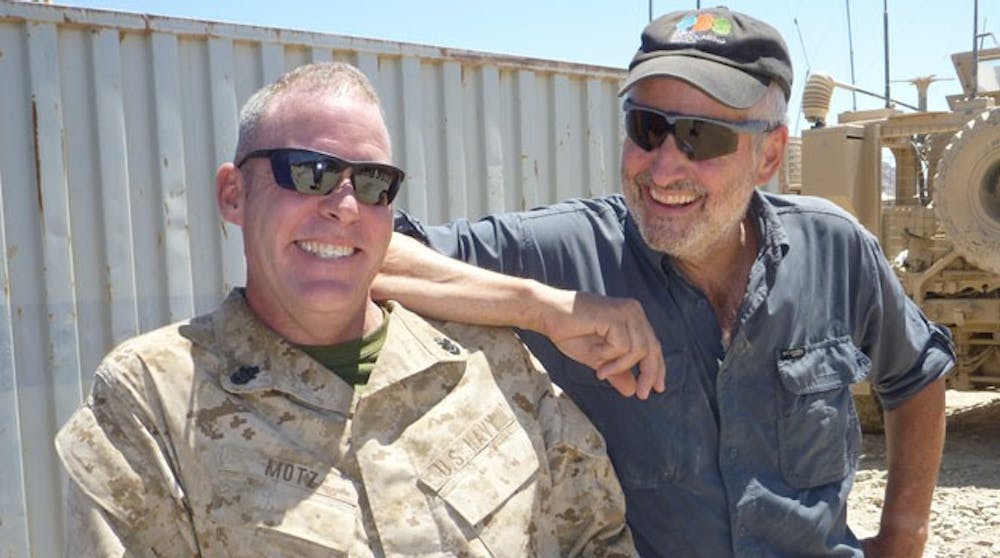Captivated by the first of many radiant sunrises he would see during his nearly ten-week stay near Kenjak-e Olya, Afghanistan last summer, journalism professor Robert Hodierne said that the evening sunsets were probably just as spectacular.
The Marine accompanying him that morning responded, "If you're lucky, you get to see both."
This grim acceptance is one aspect of the reality of war that Hodierne wanted to convey in his PBS documentary about 75 Marines serving a seven-month tour of duty in the volatile Helmand Province, located deep in hostile Taliban territory.
"Combat Outpost: Afghanistan," produced by Partisan Productions, chronicles the lives of Marines in the 2nd platoon, Alpha Company, 1st Battalion, 2nd Marine Regiment, to whom Hodierne was given completely unfettered access.
His goal was to illuminate the everyday life of a U.S. Marine, which comprises physical distress and deprivation in the blistering heat of Afghanistan.
"I want the general population to understand what these guys go through, so that when the general population is making decisions about whether or not to send people off to war, they have some better idea of what's at stake when they do that," he said.
Hodierne said that his film was not politically slanted, but sought to alleviate the "war fatigue" that Americans have developed following nearly a decade of fighting in the region.
Hodierne expects the film to be released at a time when Washington is making serious decisions about troop levels. He predicted that both supporters and opponents of the war would find comfort in his work.
"We don't deal with politics," Navy chief petty officer Eric Motz said in the trailer for the film. "We don't wear pants big enough to deal with politics."
Instead, the Marines operate in a crucible of heat, dust and violence that burdens their patience and breeds anger.
"There's a lot of enemy activity here," one marine said during the trailer. "There's a significant threat against our lives."
In late May, the patience of the unit was thrust to the brink when it was fired upon by a nearby village.
Enjoy what you're reading?
Signup for our newsletter
The Marines launched a counterattack, firing mortars, rifles and artillery into the village. Several civilians were killed and one young girl was severely wounded.
The ever-present threat of conflict helped galvanize the collective spirit of the men, as Hodierne witnessed camaraderie among the men in the unit that is not present in everyday American life.
"These guys are sleeping in the same crappy quarters, eating the same crappy food, risking their lives in the exactly the same way," he said. "Those kinds of differences evaporate."
During his time with the unit, Hodierne forged friendships with the Marines.
He, along with seniors Julia Pepe and Kristy Burkhardt, attended the unit's homecoming ceremony last month in Jacksonville, N.C., to obtain more footage for the film. But the filming team found it difficult to be merely objective bystanders.
Pepe said she became fraught with emotion while watching the men return to the comfort of their families, including one who embraced his newborn children for the first time and another who proposed to his girlfriend.
"I was happy to see them all safely home," Hodierne said. "Some of them seemed happy to see me. Grunts have a rough, dark and twisted sense of humor. I get along with them perfectly."
Pepe said that Hodierne's relationship with the men was readily apparent.
"As they got off the plane, Professor Hodierne tried to get shots of them walking off, but they were so excited to see him, hugging him ... that it was difficult for him to even hold the camera," she said.
Because of the brief amount of time between the project's conception and the departure of the Marines for Afghanistan, Hodierne had little opportunity to raise money for the project.
He had an option to pay production costs up-front or not complete the project at all. He has received some donations, including one from former Wachovia CEO and alumnus Leslie M. "Bud" Baker, Jr., but he is still seeking additional funding.
Hodierne's interest in the military began in 1966, when he dropped out of college to cover what he deemed "the biggest story of [his] generation" - the Vietnam War.
He was certain that if he did not seize the opportunity to cover the story then, it would have ended before he had an opportunity to do so. His time in Vietnam as a freelance photographer produced highly acclaimed photographs that appeared in major U.S. and European magazines.
While in Vietnam, Hodierne said he developed an admiration for the troops that he had maintained to this day. Hodierne would later cover the War in Iraq for six weeks and serve as senior managing editor of the Military Times from 2001-2008, before joining the University of Richmond faculty.
"I have very high regard for what these guys go through," Hodierne said. "I know they make mistakes.
"Sometimes their decision-making isn't the best, but there are miscreants in any military that has even gone to war. ... There will always be guys like that, but they are a distinct aberration.
"These guys are decent young men who deserve our respect."
Contact staff writer Jimmy Young at jimmy.young@richmond.edu
Support independent student media
You can make a tax-deductible donation by clicking the button below, which takes you to our secure PayPal account. The page is set up to receive contributions in whatever amount you designate. We look forward to using the money we raise to further our mission of providing honest and accurate information to students, faculty, staff, alumni and others in the general public.
Donate Now



